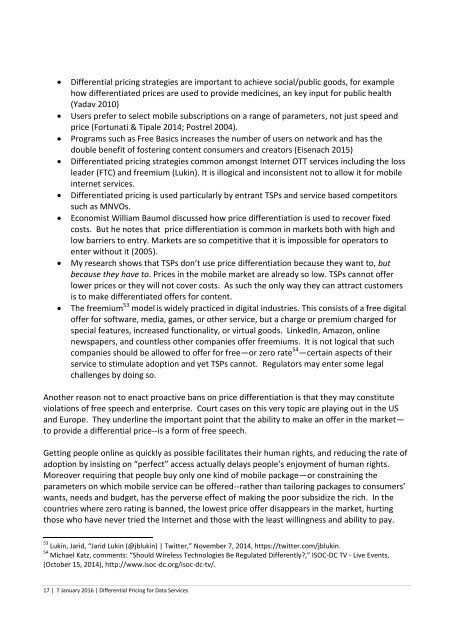Layton
Layton
Layton
Create successful ePaper yourself
Turn your PDF publications into a flip-book with our unique Google optimized e-Paper software.
Differential pricing strategies are important to achieve social/public goods, for example<br />
how differentiated prices are used to provide medicines, an key input for public health<br />
(Yadav 2010)<br />
Users prefer to select mobile subscriptions on a range of parameters, not just speed and<br />
price (Fortunati & Tipale 2014; Postrel 2004).<br />
Programs such as Free Basics increases the number of users on network and has the<br />
double benefit of fostering content consumers and creators (Eisenach 2015)<br />
Differentiated pricing strategies common amongst Internet OTT services including the loss<br />
leader (FTC) and freemium (Lukin). It is illogical and inconsistent not to allow it for mobile<br />
internet services.<br />
Differentiated pricing is used particularly by entrant TSPs and service based competitors<br />
such as MNVOs.<br />
Economist William Baumol discussed how price differentiation is used to recover fixed<br />
costs. But he notes that price differentiation is common in markets both with high and<br />
low barriers to entry. Markets are so competitive that it is impossible for operators to<br />
enter without it (2005).<br />
My research shows that TSPs don’t use price differentiation because they want to, but<br />
because they have to. Prices in the mobile market are already so low. TSPs cannot offer<br />
lower prices or they will not cover costs. As such the only way they can attract customers<br />
is to make differentiated offers for content.<br />
The freemium 53 model is widely practiced in digital industries. This consists of a free digital<br />
offer for software, media, games, or other service, but a charge or premium charged for<br />
special features, increased functionality, or virtual goods. LinkedIn, Amazon, online<br />
newspapers, and countless other companies offer freemiums. It is not logical that such<br />
companies should be allowed to offer for free—or zero rate 54 —certain aspects of their<br />
service to stimulate adoption and yet TSPs cannot. Regulators may enter some legal<br />
challenges by doing so.<br />
Another reason not to enact proactive bans on price differentiation is that they may constitute<br />
violations of free speech and enterprise. Court cases on this very topic are playing out in the US<br />
and Europe. They underline the important point that the ability to make an offer in the market—<br />
to provide a differential price--is a form of free speech.<br />
Getting people online as quickly as possible facilitates their human rights, and reducing the rate of<br />
adoption by insisting on “perfect” access actually delays people’s enjoyment of human rights.<br />
Moreover requiring that people buy only one kind of mobile package—or constraining the<br />
parameters on which mobile service can be offered--rather than tailoring packages to consumers’<br />
wants, needs and budget, has the perverse effect of making the poor subsidize the rich. In the<br />
countries where zero rating is banned, the lowest price offer disappears in the market, hurting<br />
those who have never tried the Internet and those with the least willingness and ability to pay.<br />
53 Lukin, Jarid, “Jarid Lukin (@jblukin) | Twitter,” November 7, 2014, https://twitter.com/jblukin.<br />
54 Michael Katz, comments: “Should Wireless Technologies Be Regulated Differently?,” ISOC-DC TV - Live Events,<br />
(October 15, 2014), http://www.isoc-dc.org/isoc-dc-tv/.<br />
17 | 7 January 2016 | Differential Pricing for Data Services


